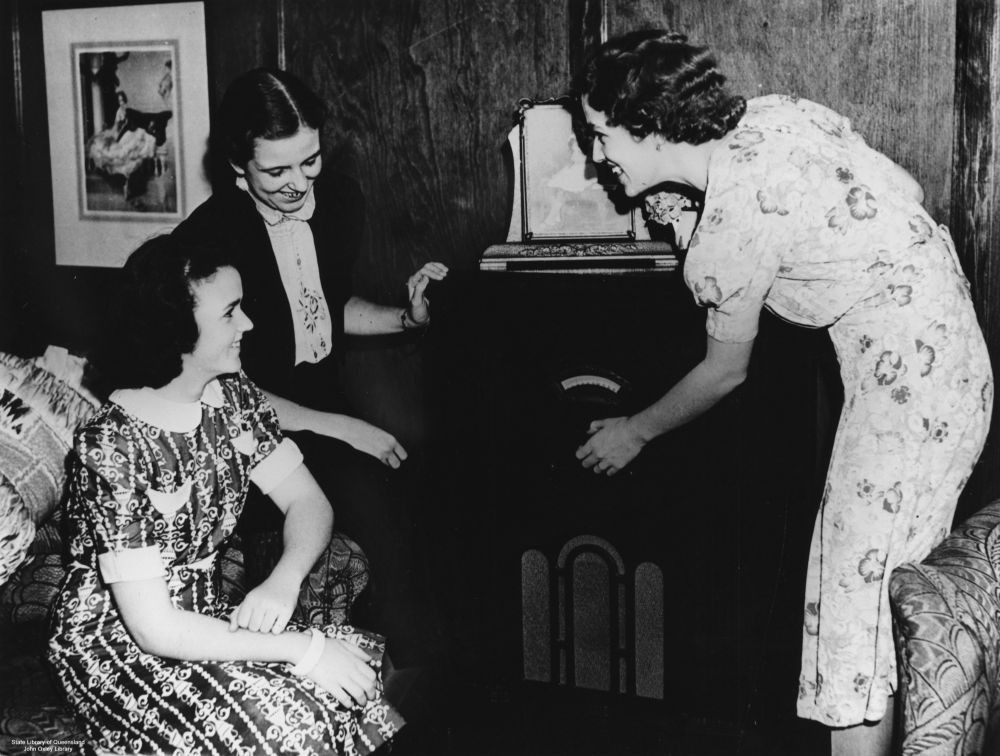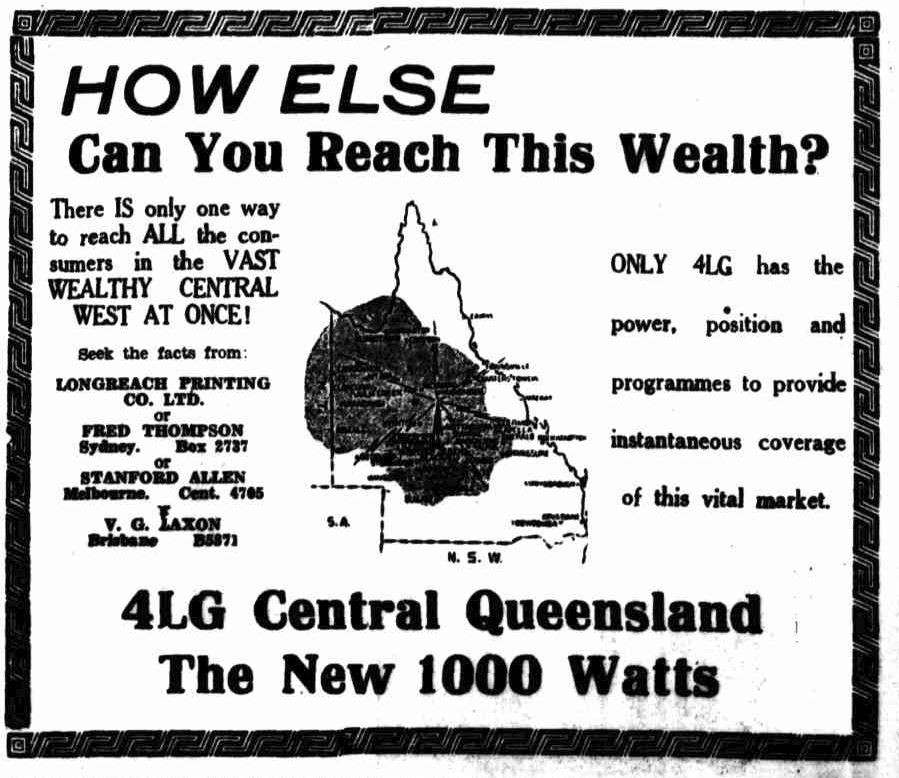It’s difficult to emphasise the importance of radio in our young lives in pre-television days in the Queensland outback. In the early 1950s, Longreach had two radio stations, ABC Radio’s 4QL and the commercial station, 4LG which rather grandly called itself “The voice of the Golden West”.

Group of friends gathered around a radio in Brisbane, ca. 1942. John Oxley Library, State Library of Queensland. Neg 102831
My active love of radio was fostered to some extent by the local Presbyterian minister who conducted a half-hour Sunday School programme broadcast each week on 4LG. One Sunday he decided to take a small group of children with him to join in the broadcast. The group was made up his own two children, Heather and Ian, and me. We were introduced individually and asked to greet our young audience. “Hello, girls and boys,” said Ian and Heather in turn. “Hello, boys and girls,” I said with great emphasis on the ‘boys’. The minister frowned good-naturedly at me at this departure from 50s etiquette which dictated that girls should always come first. Our involvement sparked much interest among the listeners and we began to take part on a regular basis. My trademark greeting always: “Hello, boys and girls.” Daring stuff! But the excitement of that primitive studio persuaded me, even at that early age to want to do “something in radio”.
I became an avid listener to both 4QL and 4LG, even to the daily weather reports on the ABC’s Country Hour. I became interested in all aspects of programming, from the daily serials to how much rain had been recorded in the previous 24 hours, at Arrilalah and Jundah and Barcaldine. Without any knowledge or understanding of stocks and shares, I looked forward each evening to hearing news from Brisbane of the changes on the stock market: “Metal Products, one and tuppence; Mount Isa Mines, four and ninepence…” and so on. “Oh, Mount Isa Mines has gone up tuppence”, I would announce to my bewildered parents.

Advertisement for Radio 4LG published in the Longreach Leader, 6 May 1949, p.15
And I became an expert in the different voices, from the national newsreaders in Sydney to local announcers in Longreach. They were all the heroes of my youth. On one occasion I was thrilled to learn that a 4LG announcer, Frank Carstairs, would be attending our school fete. On the day, he played his role as a man of the people by serving cordial to the throng of children who pushed forward to see him. When someone bumped his arm and spilled the cordial, he warned: “Be careful… that stuff stains.” For weeks afterwards I would rehearse the line in my childish version of Frank’s voice: “Be careful … that stuff stains…. That stuff stains.”
Radio presentation in the fifties was generally quite formal, and any departure from the station style was regarded seriously by management. Commercial radio has always played an important part in Australian life, and local shops and stores knew the benefits of taking an ‘ad’ on 4LG. Alan Ellis, the Barcaldine chemist, sponsored a regular slot at 12.55 each afternoon, broadcasting the record of the day. With the emergence of Elvis Presley, or Elvis the Pelvis as he was known because of his gyrating stage actions, it was inevitable that at some stage Heartbreak Hotel would be the Allan Ellis choice of the day. Straight-laced 4LG managers were not amused when the announcer introduced the Elvis record as Heartbreak Hotel by Ellis the Pelvis.
4LG broadcast a regular diet of daily serials, mostly lasting a quarter of an hour. Favourites and their catch phrases included “Doctor Paul, a true story of adult love”; “When a Girl Marries, for all those who are in love, and for those who can remember.”; “John Creasey’s Inspector West, the best selling crime stories of today.” Particular favourites were the adaptations of war stories such as Reach for the Sky, The White Rabbit and Odette. They always provided enthusiastic topics of conversation at school, and a real sense of excitement which was so lacking in our remote part of the world. On my weekly visits to the 4LG studios I was always particularly keen to see the large shellac discs on which the serials were recorded, and intrigued to discover that they were played back to front, with the needle beginning on the inside, unlike the 78s we had at home.
The radio serials caused some friction in our house as we were not supposed to listen to the radio at mealtime, especially to the more adult evening programs, such as Hagan’s Circus and Nightbeat. My mother believed that we would fall into all manner of bad habits if radio was allowed to dominate our lives in this way.
And among some of my young friends the most popular program of all was the ABC’s Children’s Hour. Whatever we were doing at 5 o’clock it was always time to sit on the side veranda beside the old Radiola and tune into 4QL waiting for the introductory theme song with its rather laboured lyrics:
Come, Old Mother Hubbard and Jack and Jill
And Tom the Piper's son.
Leave your troubles, forget your spill,
We're going to have some fun …
The programme was made up of a variety of segments for children of different age groups. It was all rather traditional, with a strong emphasis on the classics in music, art and literature. However for youngsters in the bush where there were few of the facilities of the city, it opened new horizons and ideas.
The Children’s Hour had established a members’ club, the Argonauts, based on the classic story of Jason and his ship of adventurers and their search for the Golden Fleece. Those who joined were identified as crew members of ships with the names of Greek heroes. I was keen to be involved, and became Theocritus 50, named after a Greek pastoral poet of the 3rd century. I contributed regularly to the program, mainly essays about our life in the bush. There was a flurry of excitement one day when my ship’s name and number were read out in the ‘log of progress’. That indicated that I’d chalked up 25 marks, more for effort than ability and none of my contributions were actually broadcast. The personalities of The Children’s Hour became remote friends, and did a great deal to encourage me to read, and to take an interest in the arts and classics. And the program cemented my love affair with radio that has never ended, and led to a career in journalism and the media that started in broadcasting – with the ABC.
And so radio was a vital part of our lives in the outback. It’s hard to emphasise just how important it was to us. It was long before the days of television, and radio was so varied and accessible. It could fire the imagination of an impressionable youngster like me.
Some years later, long after we’d left Longreach, and my father had been posted to Brisbane by his employer, now called the Department of Primary Industries, he was given a job with the rather grand title of Mass Media Officer. He wrote articles about all aspects of sheep husbandry, his specialty, for a variety of publications. These included the Queensland Country Life, the weekly newspaper for farmers and graziers, and for the network of local papers around the state such as the Longreach Leader. In addition he would produce and present a weekly radio broadcast with the catchy title of Let’s Talk About Sheep which was offered to the ABC for its regional stations and their daily rural programs.
Although it offered practical advice on sheep diseases and improving stock yields, for average listeners it was not ear-catching radio. My father had a slow and measured presentation, still betraying traces of his Birmingham origins. But the program was popular with its target audience, and he received a steady stream of letters from sheep farmers from around the state seeking further information and guidance. Sometimes after school I would go to his office beside the Brisbane River and sit in with him in the small, specially-built soundproof studio as he recorded his latest contribution. He would chat briefly, and then wryly say to me: “I now have to talk to my public.” And as the cumbersome reel-to-reel tape was switched on he’d begin: “Let’s Talk About Sheep, edition number 64 starts five seconds from now…Five, four….Good morning everyone. Today I want to talk to you about barber’s pole worm…”
Tony Brett Young
Comments
Your email address will not be published.
We welcome relevant, respectful comments.